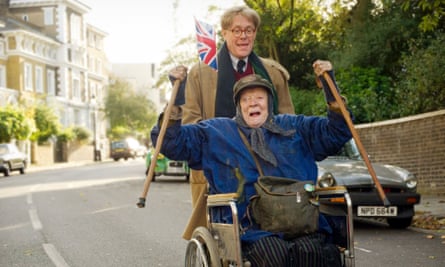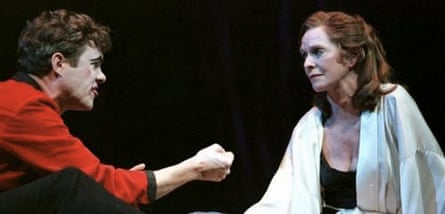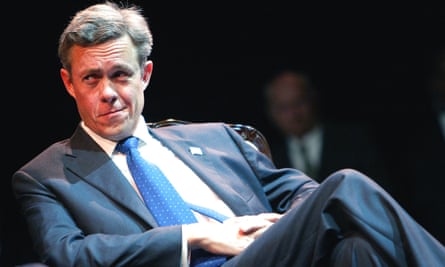Alex Jennings is Alan Bennett. That’s what the film posters for The Lady in the Van would say if Jennings had the profile he deserves. But he doesn’t, so Maggie Smith gets top billing – while Jennings gets to push the custard-coloured van.
He accepts that this is just the way of the world: when it comes to fame, film and TV always trump theatre. “I’m grown up about it,” he says, “though it’s slightly galling when you see ‘The Lady in the Van, starring Maggie Smith and James Corden’.” Corden only appears in one brief scene. But it’s impossible for Jennings to resent Smith’s star billing. “She’s a great actress and makes you want to up your game. I’ve grown up revering her and Alan. I have to pinch myself that we’ve become friends.”
Everyone must know this story by now. How the irascible sixtysomething Miss Shepherd – plus her van – pitched up outside Alan Bennett’s house in Camden, north London, in the early 1970s and stayed, mostly in his driveway, for the best part of two decades until her death. Bennett related the story and their relationship (an enigmatic, edgy friendship of two lonely misfits) in the London Review of Books in 1989. It was then published as a slim volume, was turned into a play (with Smith garlanded for her Miss Shepherd), and has now re-emerged as a film – directed, like the play, by Nicholas Hytner.
Shooting took place in Bennett’s old house in Camden, and Jennings says he was around a great deal, changing lines and giving occasional pieces of advice. “He’d come cycling down Gloucester Crescent. Sometimes Jonathan Miller [a long-time neighbour] would wander into shot. And everybody in the crescent had their own stories.”
When you watch the film, it’s hard to imagine how Shepherd could have lived in the back of a van for 15 years; and hard to understand how Bennett could have borne her spectral presence for so long. The film is mostly played as comedy, but underpinning it is a tragedy of sorts. Do we celebrate Shepherd’s unbending independence or pity the degradation of her final years?

“We did two weeks’ rehearsal early on – just me, Nick, Alan and Maggie – and it was shocking just talking about it,” says Jennings. “We asked Alan, ‘How did you allow this to happen?’ He said, ‘Well, she didn’t really impinge.’” But how did she bear those conditions? “I don’t think anybody knows. She was scary and railing at the world. There’s a great bit in the book when she terrified Vincent Price [who was paying Bennett a visit].” She turned her powerlessness into a strange sort of tyranny that helped make her life bearable.
Jennings was offered the part of Bennett in the play, but turned it down. He did, however, go on to portray the author in 2012’s Untold Stories, two short plays based on Bennett’s boyhood . “When we did that, Alan was on at me not to be too plaintive or cosy. He doesn’t want to be seen as the sort of Wind in the Willows, moley kind of person some people think he is. He wanted me to be tougher with it.” Bennett, as he has got older, has also been more willing to open up: in the film, Miss Shepherd is very suspicious of the young men he occasionally has round for unexplained meetings. I don’t recall that being in the book. Jennings has become something of a specialist at portraying real people. He gave a revelatory performance as a politically astute George Bush in David Hare’s Stuff Happens in 2004 and was a surprisingly sympathetic Prince Charles in Stephen Frears’s film The Queen in 2006. He says the key is to act, not impersonate: the characters mustn’t be “Spitting Image puppets”. He researches carefully (his next real-life role is the Duke of Windsor in Peter Morgan’s monumental Netflix series The Crown), but then tries to “let it go” and allow the character to take flight.
Why now, in his late 50s, is he playing so many real people? “I suppose I’ve always had vocal dexterity. Early on in my career, I did 18 months in BBC radio drama, where you’re just playing with your voice. I think I’ve got a good ear.”

Jennings’s great theatrical claim to fame is that he is the only person to have won Olivier best actor awards for comedy (Too Clever By Half in 1988), drama (Peer Gynt, 1996), and a musical (My Fair Lady, 2003). But it may be that his theatre success has held back his film career. “If I’d held out for a bit more film work, perhaps I could have done more,” he says. “But I wanted to play Hamlet.”
In the late 1990s, soon after he had played Hamlet (in a controversial Royal Shakespeare Company production in New York that tried to make the tragedy more upbeat), Jennings had a go at breaking into Hollywood and made The Hunley, a TV movie set in the American civil war. Starring Donald Sutherland, it told the true story of the manually propelled submarine CSS Hunley, during the 1864 siege of Charleston. The film was well received and Jennings loved Los Angeles – he says he’s a sucker for film-star chic – but his partner, Lesley Moors, was less enamoured of the lifestyle, and he was being sent to do screen tests for “completely ridiculous stuff – things like Chicago gangsters”.

Jennings is hoping more film parts will now follow, and is being cautious about taking on any long runs in the theatre. He recently finished a year-long stint as Willy Wonka in Charlie and the Chocolate Factory in the West End, taking a two-month break to shoot The Lady in the Van. At the theatre’s request, he did the show at half-term, which he says did not go down well with Smith, who felt he was spreading himself too thinly.
“I love to keep working,” he says, “but you have to wait and you have to be brave. There’s a bit of Willy Wonka money left, but my life has always been like that. At every level, it’s precarious. You can be the biggest star, but if you have a couple of turkeys it can all go a bit wobbly.”
Jennings manages to be both unassuming and intensely competitive. He has said his ambition is to appear on Desert Island Discs: he tells me (I assume seriously) that he’d also like to be on Strictly Come Dancing – and he realises these great accolades (worth more now than a knighthood or peerage) will only come if he becomes a bankable film name. Being a triple Olivier winner is lovely, but Ibsen can only get you so far.
- The Lady in the Van goes on general release on 13 November.

Comments (…)
Sign in or create your Guardian account to join the discussion